Sustainable Cooperation

How can climate cooperation contribute to sustainable development goals ?
Climate cooperation plays a crucial role in achieving the United Nations' Sustainable Development Goals (SDGs), which aim to ensure that all people have access to the resources they need to live healthy, productive, and sustainable lives. By working together on climate action, nations can make significant progress towards several SDGs, including those related to poverty, hunger, health, education, gender equality, clean water and sanitation, affordable and clean energy, economic growth, and partnerships for the goals. Climate cooperation helps reduce the impacts of extreme weather events, natural disasters, and climate change on vulnerable communities, thereby contributing to poverty eradication efforts. It supports sustainable agricultural practices and promotes resilient food systems, ensuring food security and nutrition for all. Climate action helps reduce air pollution and improve public health outcomes, contributing to better respiratory health and overall well-being. Engaging women and girls in climate actions promotes gender equality by providing opportunities for leadership and participation in decision-making processes. Climate cooperation helps protect water resources from climate-related hazards, ensuring access to clean water and sanitation for all. Collaborative efforts in renewable energy research, development, and deployment contribute to universal access to affordable, reliable, and modern energy services. Climate cooperation creates green jobs and promotes sustainable economic growth, particularly in industries such as renewable energy and sustainable agriculture. Partnerships formed through climate cooperation drive innovation in sustainable technologies and infrastructure, fostering industrial development while minimizing environmental impacts. By addressing climate change, which disproportionately affects marginalized communities, climate cooperation helps reduce social and economic inequalities both within and among countries. Climate actions support urban planning and management that enhances inclusivity, resilience, and environmental sustainability in cities and human settlements. Climate cooperation encourages responsible consumption patterns and sustainable production methods, reducing waste and environmental degradation. This goal is directly linked to climate cooperation as it involves taking urgent action to combat climate change and its impacts. Through ocean conservation and sustainable fishing practices, climate cooperation helps protect marine ecosystems and biodiversity. By promoting sustainable land use and forest management, climate cooperation contributes to the conservation of terrestrial ecosystems and biodiversity. Climate cooperation builds peaceful societies and effective governance structures capable of managing environmental challenges and conflicts arising from resource scarcity. Climate cooperation itself is a form of international partnership that leverages collective action to achieve the SDGs more effectively. In conclusion, climate cooperation is not only essential for mitigating the effects of climate change but also for advancing the broader agenda of sustainable development. By integrating climate actions into national policies and international collaborations, we can work towards a future where environmental protection, social equity, and economic prosperity are mutually reinforcing goals.

What is the role of international cooperation in achieving the Sustainable Development Goals ?
The text discusses the crucial role of international cooperation in achieving the Sustainable Development Goals (SDGs), which aim to address global challenges such as poverty, inequality, climate change, and environmental degradation. The SDGs cannot be achieved by individual countries alone but require collective action and collaboration at the global level. Key points include the need for global solutions to interconnected issues like climate change; sharing knowledge and best practices between countries; mobilizing financial resources and expertise; promoting policy coherence across sectors; and strengthening multilateral institutions like the United Nations. Examples of international cooperation in achieving the SDGs include climate change agreements like the Paris Agreement, global health initiatives against diseases like HIV/AIDS, tuberculosis, and malaria, and trade agreements that can promote sustainable development if designed correctly. Overall, international cooperation is an integral part of achieving the Sustainable Development Goals.

How can we improve international cooperation among nations ?
The text outlines ways to improve international cooperation among nations, including enhancing diplomatic relations through regular dialogues and cultural exchange programs; collaborating on global issues such as climate change, poverty, hunger, peace, and security; sharing knowledge and technology by research collaboration and protecting intellectual property rights; promoting trade and economic cooperation by reducing barriers, investing in infrastructure, and maintaining fair labor standards; and building capacity for global governance by strengthening institutions and supporting developing countries.

How can international cooperation help address the challenges of climate change and energy security ?
The text discusses the importance of international cooperation in addressing climate change and energy security challenges. It highlights the benefits of sharing knowledge, joint research and development, implementing global agreements, and access to financing and investment. The text also suggests strategies for promoting clean energy technologies, strengthening policy frameworks, enhancing capacity building, and facilitating trade and investment. Overall, the text emphasizes that international cooperation is essential for creating a sustainable future.
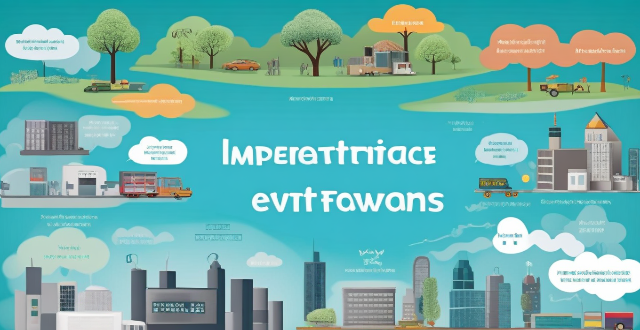
What is the role of international cooperation in shaping renewable energy policies ?
The text discusses the importance of international cooperation in developing renewable energy policies worldwide. It highlights three main benefits: sharing knowledge and best practices, accessing financing and investment opportunities, and addressing global challenges such as climate change, air pollution, and energy security. Examples are provided for each benefit, including technical workshops, research collaborations, policy forums, multilateral development bank loans, green bonds, private sector partnerships, climate change agreements, joint research efforts, and energy security initiatives. The conclusion emphasizes that international cooperation is crucial for accelerating the transition to a more sustainable and equitable energy system.

Can international cooperation help mitigate climate-related conflicts ?
The text discusses how climate change can exacerbate conflicts and the role of international cooperation in mitigating these impacts. It outlines various challenges posed by climate change, such as water scarcity, food insecurity, natural disasters, and economic instability, and how they can lead to conflicts. The text then explores the potential roles of international cooperation, including diplomacy, technology transfer, financial support, education, and capacity building. It also highlights challenges to achieving effective international cooperation, such as political will, economic disparities, and cultural differences. Finally, the text concludes that international cooperation is essential in addressing climate-related conflicts and that collaborative efforts can lead to a more resilient and equitable world.

Can you provide examples of successful international cooperation initiatives ?
Successful International Cooperation Initiatives International cooperation is a vital aspect of global progress, enabling countries to work together towards common goals. Here are some examples of successful international cooperation initiatives: 1\. The United Nations Framework Convention on Climate Change (UNFCCC) aims to stabilize greenhouse gas concentrations in the atmosphere at a level that prevents dangerous human interference with the climate system. It has been ratified by 197 parties, making it one of the most widely accepted international agreements. 2\. The World Health Organization (WHO) is the directing and coordinating authority on health within the United Nations system. It provides leadership, research, norms and standards, and technical support to countries worldwide. 3\. The International Space Station (ISS) is a joint project among five space agencies: NASA (United States), Roscosmos (Russia), JAXA (Japan), ESA (European Space Agency), and CSA (Canadian Space Agency). It serves as a microgravity and space environment research laboratory. 4\. The Convention on International Trade in Endangered Species (CITES) is an international agreement between governments aimed at ensuring that international trade in wild animals and plants does not threaten their survival. It regulates or bans trade in species listed in its appendices.

How has technology impacted international cooperation in recent years ?
The text discusses the impact of technology on international cooperation in various sectors such as communication, collaboration tools, access to information, globalization of trade and commerce, and environmental sustainability. Technology has improved communication through instant messaging, social media, and email, enhanced collaboration tools like project management software and video conferencing, increased access to information with open source data and online news sources, globalized trade and commerce through e-commerce platforms and digital payment systems, and promoted environmental sustainability with climate modeling and renewable energy technologies. Overall, technology has had a significant positive impact on international cooperation.

How does space exploration impact global cooperation and diplomacy ?
Space exploration has been a significant driver of global cooperation and diplomacy since the dawn of the space age. The pursuit of understanding our universe and the quest to explore beyond Earth's boundaries have fostered international collaboration, technological advancements, and diplomatic engagements that transcend traditional geopolitical tensions. In this discussion, we will delve into the various ways space exploration influences global cooperation and diplomacy.

Can national governments alone tackle the issue of climate change, or is international cooperation necessary for effective global climate governance ?
Climate change is a complex issue that requires global cooperation to effectively tackle. While national governments can implement policies and invest in research within their borders, the interconnectedness of climate change factors necessitates international collaboration. Global agreements, technology transfer, and financial support are crucial components of this cooperation. Ultimately, a combination of national efforts and international partnerships is needed for effective climate governance.

How can international cooperation aid virus origin tracing efforts ?
The text discusses the importance of international cooperation in virus origin tracing efforts. It outlines various ways in which collaboration can aid this process, including sharing information and data through global databases and real-time reporting systems; pooling resources and expertise by establishing centralized laboratories and training programs; coordinating responses and policy making through global health organizations and international agreements; and building public trust through transparent communication and community engagement. The text emphasizes that successful virus origin tracing requires a multidisciplinary approach and the involvement of experts from different fields. It highlights the need for transparency, openness, and ethical considerations in research activities to ensure cultural sensitivity and community benefits. Overall, the text underscores the significance of international cooperation in unraveling the mysteries of virus origins and preventing future pandemics.

How do sports events promote interfaith understanding and cooperation ?
Sporting events serve as a platform for promoting interfaith understanding and cooperation by breaking down barriers, encouraging dialogue, building partnerships, and promoting peace. Through shared passion for sports, principles of sportsmanship, mixed teams, celebration of diversity, joint community projects, interfaith leagues, peace through play initiatives, and role models, sports events can contribute to a more harmonious society where interfaith cooperation is the norm.

How can we promote sustainable development to reduce the risk of climate conflicts ?
Sustainable development is crucial for reducing the risk of climate conflicts. To promote it, we can increase awareness and education, promote renewable energy sources, implement sustainable agriculture practices, invest in green infrastructure, encourage waste reduction and recycling, and collaborate with governments and NGOs.

What role does international cooperation play in enhancing global health security ?
In the realm of global health security, international cooperation plays a pivotal role. This collaboration among nations and organizations is crucial for addressing health challenges that transcend borders. Here's how international cooperation enhances global health security: ## Surveillance and Early Warning Systems - **Global Surveillance Networks**: By sharing information on disease patterns and potential threats, countries can work together to detect and respond to emerging health risks more effectively. - **Joint Research Efforts**: Collaborative research initiatives help to identify new pathogens and develop diagnostic tools, treatments, and vaccines. ## Strengthening Health Systems - **Capacity Building**: Weaker health systems can be supported through knowledge transfer, training programs, and infrastructure development. - **Resource Allocation**: International aid and funding can target areas most in need, improving healthcare access and quality. ## Coordinated Response to Health Crises - **Disaster Relief**: In times of crisis, such as natural disasters or large-scale outbreaks, international teams can provide urgently needed medical assistance. - **Policy Harmonization**: Aligning policies and procedures across countries ensures a cohesive approach to managing public health emergencies. ## Research and Innovation - **Technology Transfer**: The exchange of innovative medical technologies and practices can lead to better prevention and treatment options globally. - **Collaborative Trials**: Multi-country clinical trials accelerate the evaluation and adoption of new interventions. ## Education and Training - **Skill Development**: International educational programs prepare healthcare workers with the latest knowledge and skills. - **Public Awareness Campaigns**: Joint efforts in public health education can improve global health literacy and promote preventive measures. ## Norms and Standards - **Harmonization of Regulations**: Uniform standards for drugs, vaccines, and medical devices ensure quality and safety worldwide. - **Ethical Guidelines**: International ethical standards protect research participants and ensure the integrity of scientific endeavors. ## Financial Support - **Investment in Health**: International financing mechanisms provide critical funding for health programs. - **Economic Stabilization**: Financial support during health crises can prevent economic collapse in affected regions. ## Information Sharing - **Transparency**: Open communication about health issues encourages trust and cooperation among nations. - **Best Practices**: Sharing successful strategies helps all countries learn from each other's accomplishments and mistakes.

What role do international sports organizations play in fostering global cooperation ?
International sports organizations are crucial for global cooperation, promoting peace, cultural exchange, economic development, health, gender equality, environmental sustainability, and humanitarian aid.

Can carbon credits be a sustainable source of income for developing countries ?
The article explores the potential of carbon credits as a sustainable source of income for developing countries, highlighting their benefits in revenue generation, sustainable development, and international cooperation. However, it also underscores the challenges such as market volatility, implementation complexities, and ensuring environmental integrity. The conclusion emphasizes that with robust frameworks and transparent monitoring, carbon credits can be a cornerstone of sustainable development strategies for developing countries.

How can we promote sustainable development while also tackling climate change and poverty ?
The text discusses a multi-faceted approach to promote sustainable development, tackle climate change and poverty. It suggests strategies such as renewable energy adoption, green economy and job creation, circular economy and resource efficiency, sustainable agriculture and food systems, conservation and protection of natural resources, and inclusive governance and partnerships. By implementing these strategies, we can work towards creating a more equitable and sustainable future for all.

How does sustainable development contribute to the fight against climate change ?
Sustainable development is crucial in the fight against climate change. It aims to balance economic growth, social inclusion, and environmental protection. Mitigating climate change involves transitioning to renewable energy, improving energy efficiency, and developing green infrastructure. Adaptation strategies include sustainable agriculture, water management, and coastal protection. Social equity and environmental justice are also key, with access to clean energy, healthy communities, and climate education being vital. Policy and governance play a significant role through regulatory frameworks, international cooperation, and public participation. Sustainable development provides a framework for integrating climate action into all aspects of society, ensuring a resilient, equitable future for all.

How can climate information sharing contribute to sustainable development goals ?
**How Can Climate Information Sharing Contribute to Sustainable Development Goals?** Climate information sharing plays a crucial role in achieving sustainable development goals (SDGs). This article discusses the various ways in which climate data can contribute to environmental sustainability, social equity, and economic growth. Key points include: 1. **Improving Resilience to Climate Change**: Early warning systems, adaptation planning, and infrastructure development are all enhanced by shared climate information. 2. **Supporting Sustainable Agriculture**: Farmers can use climate data for crop planning, water management, and pest and disease control. 3. **Promoting Clean Energy Solutions**: Climate information aids in renewable energy site selection, energy efficiency, and demand forecasting. 4. **Enhancing Biodiversity Conservation**: Habitat protection, species survival, and ecosystem services are all influenced by climate trends. 5. **Advancing Gender Equality**: Providing women with climate information can empower them and reduce their vulnerabilities during climate-related disasters. 6. **Fostering Partnerships for Sustainable Development**: Multi-stakeholder engagement, international cooperation, and public-private partnerships are all facilitated by climate information sharing. In conclusion, ensuring that stakeholders have access to accurate and timely climate data is essential for making progress towards a more sustainable future.
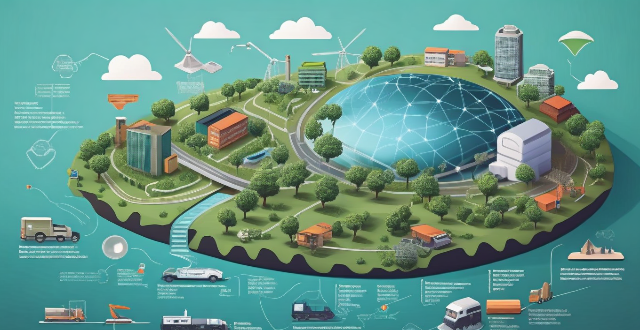
What are the benefits of international climate cooperation ?
International climate cooperation is crucial for mitigating global warming, adapting to climate change, protecting biodiversity, creating economic opportunities, enhancing global security, and promoting social justice. By working together, countries can reduce greenhouse gas emissions, develop clean energy technologies, share resources and knowledge, strengthen infrastructure, conserve ecosystems, prevent extinction, grow a green economy, create jobs, manage resources more effectively, improve public health, address climate injustice, and ensure equitable access to sustainable technologies. This collective effort is essential for preserving our planet's delicate ecosystems and ensuring a sustainable future for all.
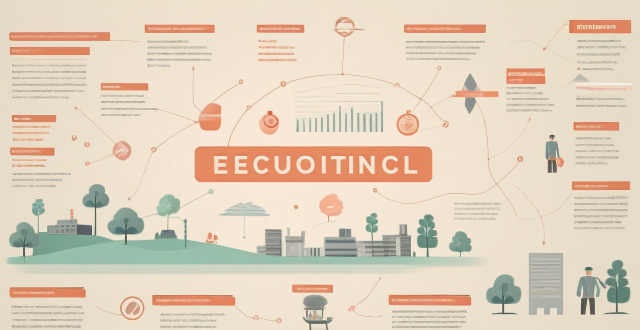
How does climate cooperation impact global economic growth ?
Climate cooperation has a positive impact on global economic growth by fostering new industries, promoting international trade and investment, stimulating innovation and research, enhancing resilience against climate impacts, and encouraging policy coherence and stability.

What is sustainable development and why is it important ?
Sustainable development is a concept that aims to meet the needs of the present without compromising future generations' ability to meet their own needs. It is crucial for addressing poverty, inequality, climate change, and environmental degradation. Sustainable development promotes economic growth, social inclusion, and environmental protection. It encourages renewable energy use, sustainable agriculture, and green technologies to create job opportunities and reduce unemployment. By ensuring access to basic services, it helps reduce poverty and improve living standards for all segments of society. Promoting gender equality is an integral part of sustainable development. It also focuses on reducing greenhouse gas emissions, adapting to climate change, conserving forests, protecting biodiversity and natural resources, controlling pollution, preventing conflicts over resources, aiding in post-conflict recovery, and reducing disaster risks. Sustainable development offers a framework for addressing complex global challenges while ensuring long-term ecological sustainability.

What are the benefits of international cooperation in solving global issues ?
International cooperation is vital for addressing global challenges, offering benefits such as pooled resources, enhanced security, sustainable development, scientific advancement, and fostering mutual understanding. By combining efforts, nations can achieve more significant progress towards peace, sustainability, and development than they could independently.

How can climate cooperation help mitigate the effects of extreme weather events ?
Climate cooperation is crucial in mitigating the effects of extreme weather events. It involves collaborative efforts between nations, organizations, and individuals to address climate change challenges. Key points include development of early warning systems, enhanced disaster risk reduction, promotion of sustainable practices, strengthened international agreements and policies, increased funding and resource allocation, promotion of environmental education and awareness, and facilitation of humanitarian aid and recovery efforts. By working together, we can build a more resilient world capable of withstanding the challenges posed by a changing climate.

How can international cooperation improve global climate governance ?
International cooperation is crucial in the fight against climate change. It can improve global climate governance by enhancing information sharing and technology transfer, promoting policy coordination, strengthening legal frameworks, facilitating financial flows, building capacity and institutions, and promoting public awareness and participation. Countries can work together to collect and analyze data on climate change, share advanced technologies, coordinate policies, engage in joint research, enforce international agreements, provide climate finance, encourage green investments, build capacity for implementing climate policies, establish strong institutions, raise public awareness, and engage civil society organizations. By working together, countries can address the challenges of climate change more effectively and create a sustainable future for all.
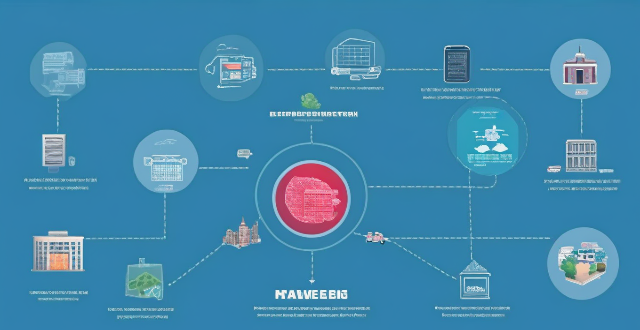
How can circular economy policies help achieve the United Nations Sustainable Development Goals ?
Circular economy policies align with the United Nations Sustainable Development Goals by reducing resource depletion, minimizing waste and pollution, promoting energy efficiency, creating jobs, enhancing resource efficiency and sustainable infrastructure, fostering global partnerships, supporting sustainable communities, encouraging innovation and education, and contributing to climate action. These policies offer a comprehensive approach to achieving sustainability by promoting a system that is restorative and regenerative by design, providing economic and social benefits and being a critical component of global sustainable development efforts.

What are some examples of successful interventions in climate-related conflicts ?
The text discusses how climate change contributes to conflicts around the world and presents several successful interventions that have mitigated these conflicts. These interventions include Integrated Water Resource Management (IWRM), Renewable Energy Projects, Climate Change Education and Awareness Programs, Early Warning Systems and Disaster Risk Reduction, and International Cooperation and Legal Frameworks. The objective of these interventions is to manage resources sustainably, reduce dependence on fossil fuels, raise awareness about climate change impacts, establish effective early warning systems, and foster international cooperation. The implementation of these interventions has resulted in success stories such as reducing tensions between neighboring countries, providing sustainable energy sources, building resilience among vulnerable communities, saving lives during natural disasters, and promoting global cooperation in addressing climate change. Overall, the text emphasizes the importance of proactive measures to address climate-related conflicts effectively and promote peace and cooperation.

How can businesses contribute to sustainable consumption ?
Businesses can contribute to sustainable consumption by adopting circular economy principles, managing green supply chains, using eco-friendly packaging, practicing product stewardship, improving energy efficiency, conserving water, engaging in responsible marketing, promoting innovation, engaging stakeholders, and supporting environmental initiatives. These practices help reduce waste, minimize resource use, and inspire sustainable consumer behavior.
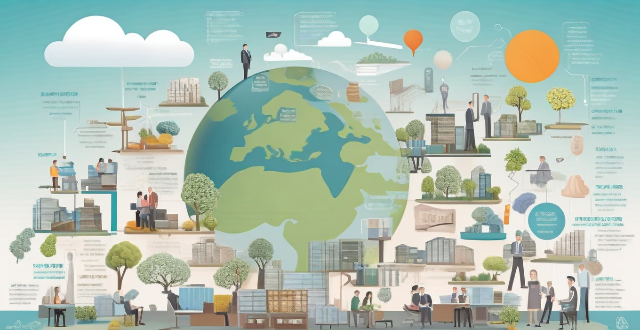
What is the importance of international cooperation in addressing climate change ?
International cooperation is crucial in addressing the global challenge of climate change. It enables shared responsibility, economic efficiency, political will, global impact, innovation and technology transfer, and strengthening multilateralism. By working together through international organizations and treaties, countries can take decisive action on climate change and create a sustainable future for all.

What are the main sources of sustainable energy ?
The text discusses the various main sources of sustainable energy, including solar energy, wind energy, hydropower, geothermal energy, bioenergy, tidal and wave energy, and hydrogen energy. It also highlights the importance of adopting sustainable energy for environmental impact, economic benefits, energy security, and health considerations. The transition to sustainable energy requires investment, policy support, and technological innovation.